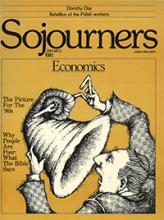It has been a warm fall, and clear, except for last few days of rain. Even their damp chill may have contained a blessing. Ten degrees colder, the rain would have been snow. As it was, it greened up the campus for Parents' Weekend, and now the sun has come back for the occasion. The only thing I regret is the loss of a true Indian summer which, though spiritually discerned, always waits for the first snow. It is apple harvest, and the trees are full.
I live on a third of an acre: house, garage, small garden, large self-seeding raspberry patch," and three apple trees. One, the queen, has an aloof, shapely crown and bears at midsummer every second year; its fruit is tart but soft and extremely perishable. The other two are red and golden delicious, gnomelike trees bearing in the fall respectively a crisp cone-shaped apple sweet enough to eat plain and a chubby yellow fruit that is tarter and makes good pies.
But the trees are a presence in themselves and give other gifts than fruit--temporary, concentrated pleasures like the literally incredible sweetness of the air when they are blossoming, and the ozone of softening apples that enters your nose like the tang of smoke after the fruit has started to fall.
My care of the trees has been spotty. When I came here my bookish eyes saw even fruit trees as decoration. Except that I mowed around them and picked an occasional basketful, the trees had to thrive on neglect--which they did, heaping with fruit year after year, dripping apples into the thick grass to rot and feed the ants and turn the lawn hummocky and splotchy as a balding skull.
I write this now with a certain shame. Not that the trees suffered; I don't think they did. But the loss of those harvests, to myself and my neighbors, has become for me an image of waste: an image, because the loss of a few bushels of apples is trivial set in the context of the world's hunger. But still waste--sheer, mindless, unjustifiable waste.
Read the Full Article

